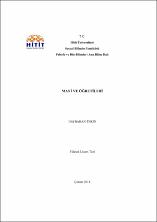Mani ve öğretileri
Citation
Baran Tekin, D. (2014). Mani ve öğretileri (Yüksek Lisans Tezi).Abstract
Bu çalışma, Manihaizm'in kurucusu Mani ve öğretisini konu edinmektedir. Bu bağlamda gnostik geleneğin en önemli temsilcilerinden olan Mani Dini, kurucusunun sahip olduğu etnik köken, yetiştiği çevre, yazdığı kitaplar, gerçekleştirdiği misyonik faaliyetler ve tebliğ ettiği mesajın mahiyetine ilişkin konular çerçevesinde ele alınmıştır. Bunlar yapılırken yeri geldiğince Mani'nin inanç ve düşüncelerine kaynaklık eden kültürel geri plana ait izlerden de bahsedilmiştir. Giriş, üç ana bölüm ve sonuçtan oluşan bu çalışmanın, giriş bölümünde araştırmanın konusu, önemi, amacı ve araştırma yapılırken kullanılan yöntem ve kaynaklar üzerinde durulmuştur. Birinci bölümde eldeki mevcut kaynaklar çerçevesinde Mani'nin yaşamı incelenmiş, ayrıca onun oluşturduğu öğretinin inanç esaslarını kaleme aldığı kitaplara ilişkin ayrıntılı bir anlatıma yer verilmiştir. İkinci bölümde Mani'nin teolojisi ortaya konmaya çalışılmıştır. Bu bağlamda Tanrı inancı, Tanrı'nın düşüşü, evren ve insanın yaratılışı, kurtuluş süreci, eskatoloji ve yaratım süreçlerinde ortaya çıkan tanrılar hiyerarşisi konuları ele alınmıştır. Üçüncü bölümde ise Mani'nin öngördüğü cemaat yapılanmasına ve bu inancın gerektirdiği ibadet ve ritüellere değinilmiştir. Çalışma, eldeki verilerin analiz edilip değerlendirildiği sonuç kısmı ile sonlandırılmıştır. This study mentions Mani, the founder of Manichaeism, and his doctrines. In this context Manichaeism which is one of the most important representatives of the Gnostic tradition, is discussed within the framework of ethnicity of Mani, his environment in which he grew up, his books, his missionary activities and issues related to the nature of the message communicated. During this study, where necessary, traces of cultural background being source of Mani's beliefs and thoughts are mentioned. In the introduction part of this study consisting of introduction, three main sections and conclusion, it is focused on subject, importance, purpose, methods and sources used in research process. In the first section, within the framework of available resources Mani's life is examined, moreover a detailed narration related to his books in which he indited principles of his doctrines created by himself is presented. In the second section, it is attempted to put forward Mani's theology. In this context, it is discussed on subjects of belief in God, fall of God, the creation of universe and human, the redemption process, eschatology and the hierarchy of gods emerged in the process of creation. In the third section, it is touched on structuring of congregation predicted by Mani and worship and rituals, requirements of this faith. The study has been ended with the conclusion section in which available data has been analysed and evaluated.


















